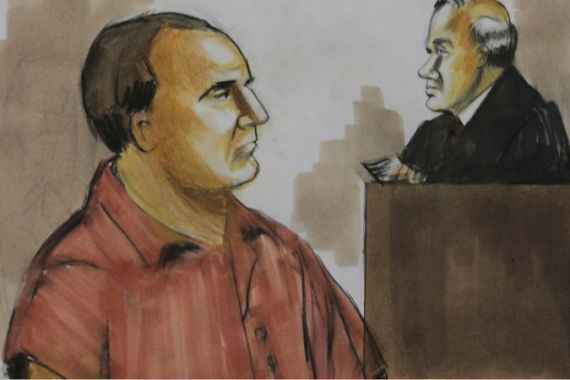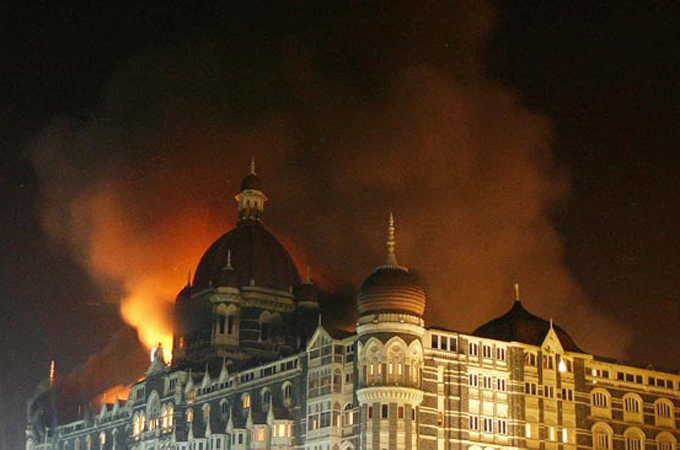ISI link to Mumbai attack claimed
Indian documents leaked to UK paper detail “dozens” of meetings between fighters and Pakistani intelligence agents.

 |
| Flames erupt from the top floor of Mumbai’s Taj Mahal hotel during the November 2008 terrorist attacks [Reuters] |
David Headley, a US informant who scouted locations to help militants prepare for the November 2008 Mumbai attacks, told Indian interrogators this summer that members of Pakistan’s military intelligence, the Inter-Services Intelligence agency (ISI), were closely involved in planning the assault, according to the Guardian newspaper and Associated Press news agency (AP).
Headley said ISI agents met members of Lashkar-e-Taiba, the Pakistan-based armed group responsible for the attack, “dozens” of times beforehand. The ISI supported the Mumbai operation because it hoped that a spectacular attack would provide jihadi groups in the contested state of Kashmir with a “sense of achievement” and would shift the “theatre of violence” from Pakistan to India.
Such groups, including the Lashkar, are believed to maintain ties to the ISI and Pakistani government, unlike more extemist groups, such as the Taliban and al-Qaeda, which pose a threat to Islamabad.
The ISI hoped that a successful Lashkar operation would halt ongoing attrition from the Lashkar to the Taliban and al-Qaeda, Headley claimed.
The new allegations of ISI involvement in the Mumbai assault come from a 109-page classified report by the Indian government that documents Headley’s interrogation in the United States in June. The Guardian and AP both obtained a copy of the report.
The well-executed, three-day operation by 10 attackers included raids on two luxury hotels, a major train station and a Jewish outreach centre. More than 160 people died and hundreds more were wounded.
The US and India have blamed the Lashkar for the Mumbai attacks, and the lone surviving attacker has admitted the group carried out the operation.
Allegations of ISI ties to Lashkar are not new; in July, Indian Home Secretary GK Pillai said members of the group are the “clients and creations” of the ISI and that the Pakistani spy agency was “literally controlling and co-ordinating” the Mumbai attack “from the beginning until the end”.
Pakistan has admitted that parts of the attack were planned on its soil and has arrested Pakistani citizens as a result.
US informant
Though Headley claimed he met several ISI agents and was, in one meeting, given $25,000 by an ISI handler to finance one of his reconnaisance missions in India, he also indicated that high-ranking ISI officers may not have known about the Mumbai operation.
After the attacks, Lieutenant-General Shuja Pasha, the ISI’s director-general, visited a senior Lashkar member in prison to try to “understand” the operation. Headley reportedly took this as an indication that Pasha had not known about the attack, or at least its scope and aims.
But Headley also described multiple occasions when he gave ISI agents computer memory sticks that contained images and video of various landmarks in Mumbai. Headley interacted with several reputed ISI officers in the two years prior to the attack: During a 2006 interrogation by “Major Ali,” he described his role in the Lashkar; later, he received the $25,000 reconnaisance payment from a man called “Major Iqbal,” whose supervisor, “Lieutenant-Colonel Hamza” was also involved in debriefings.
On Saturday, the US government acknowledged to the Washington Post newspaper and non-profit journalism group ProPublica that Headley had during the 1990s and 2000s been an informant for the Drug Enforcement Administration (DEA).
Headley’s work for the DEA began in the 1990s after he was arrested for participating in a Pakistani heroin-smuggling operation. He was apparently reactived as an informant after the September 11, 2001, attacks in New York City and Washington, DC, though the US government denies he continued his work through his time as a Lashkar planner.
The Federal Bureau of Investigation was tipped off about Headley’s Lashkar membership in 2005 by one of his three wives, a woman who filed domestic abuse charges against him. By that time, Headley had been working with the Lashkar – and telling his wife he was doing so on a “secret mission for the US government” – for some three years.
According to ProPublica, there were signs that Headley remained a government informant, or at least under the supervision of the US government, for years after September 11. In December that year, he was discharged from probation by a federal judge even though the scheduled end date for his probation was not set to come until 2004 – a possible sign that he was still receiving favourable treatment from the US government for his work. Within two months, Headley was training with Lashkar in Pakistan, and over the next three years, he made five trips to Lashkar camps.
After the 2005 domestic abuse charges, Headley was arrested, released and never charged. His wife provided investigators from the Joint Terrorism Task Force in New York with audio cassettes and ideological material and described Headley’s Lashkar training, ProPublica reported. But it’s unclear if the government ever followed up on the tip, and law enforcement officials told ProPublica that such tips come to the government half a dozen times a day.
During Headley’s ensuing visits to India, he used his US passport to travel, and he set up a Mumbai branch of a US immigration business run by his friend. The government apparently did not detain Headley again after the domestic abuse arrest.
Timothy Roemer, the US ambassador to India, told an Indian news programme on Monday that the US warned India “at least three times” before the Mumbai attacks.The US government has so far denied that Headley was working as an informant during his Lashkar scouting, but Headley’s repeatedly favourable treatment and US knowledge of the impending attack raise questions about whether his activities were still being monitored by US law-enforcement or intelligence agencies.
Headley was arrested in October 2009 and is currently in US custody in Chicago, where he has become a “treasure trove” of information about Lashkar-e-Taiba and al-Qaeda, ProPublica reported.